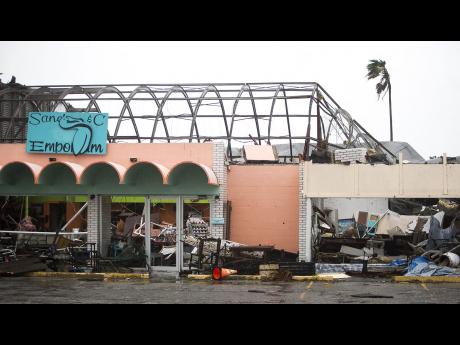What impact will the 2017 Atlantic hurricane season have on the cost of property insurance in Jamaica and the rest of the Caribbean in 2018? The season officially ended on November 30. Also, many companies and organisations have already began planning for their next financial year. Will the price of insurance increase and, if so, by how much?
A UPI report states that “… eighteen named storms were recorded in 2017 from Tropical Storm Arlene in April to Tropical Storm Rina in November. Ten became hurricanes, and six of those attained “major” classification (category 3 strength or greater).” That number exceeded the predictions of the National Oceanic and Atmospheric Administration. This year was the most active hurricane season in seven years.
2017 set another record. According to the same report, in August, five out of six hurricanes Harvey, Irma, Jose, Lee and Maria became “major” within 30 days. Three of them Harvey, Irma and Jose formed consecutively. Some experts have said that “this year’s storms caused nearly $370 billion in damage worldwide”.
The perspectives of local experts are consistent with those overseas. In her review of 2017, Mrs Saundra Bailey, chief operations officer of CGM Gallagher Group, insurance and reinsurance brokers, a company that trades regionally, says many of the same things as her foreign counterparts. It estimates that it will be involved in the settlement of HIM claims amounting to more than US$100 million. “The … season will never be forgotten in the Caribbean. HIM (Harvey, Irma and Maria) have left a wave of uncertainty in the insurance sector not only in the region, but (also) in the international reinsurance market.” Regional insurance companies buy substantial amounts of reinsurance overseas in order offer insurance against hurricanes and earthquakes to their policyholders. In many cases, 80-90 cents of every $1 of premium collected ends up in the hands of reinsurers.
Successive devastating incidents like the ones earlier this year which swept through the Caribbean and affected the US Gulf Coasts are viewed by industry specialists as either earnings events or capital events. Earnings events are temporary. They affect the financial results during a given reporting period, like a quarter or a financial year. A capital event is more serious. It weakens the reinsurers’ capital. That effect can only be fixed by the infusion of more capital if the entity continues to trade and wants to retain market confidence. Some experts say that the 2017 hurricane payouts will constitute a capital event for several reinsurance companies and an earning event for others.
Mrs Bailey is forecasting that “The combined effects of HIM, the earthquakes in Mexico and other losses around the world will cause the property rates to harden,” next year. Even though Jamaica was not hit, she says that “Reinsurers have telegraphed to regional insurers, including those in Jamaica, rate increases ranging anywhere between 20 and 50 per cent.” The increase will come into effect on January 1.
Reinsurers are also pushing for other changes. Currently, property policies exclude the first two per cent of each loss per item arising from catastrophes (defined as hurricane, flood, fire and earthquake) per insured item. The excluded amount is referred to as the deductible or excess. If reinsurers have their way, according to Mrs Bailey, the deductible will apply to the total amount that is insured at each location. Policyholders will be required to assume a greater share of the risk burden in addition to paying more.




Leave A Comment